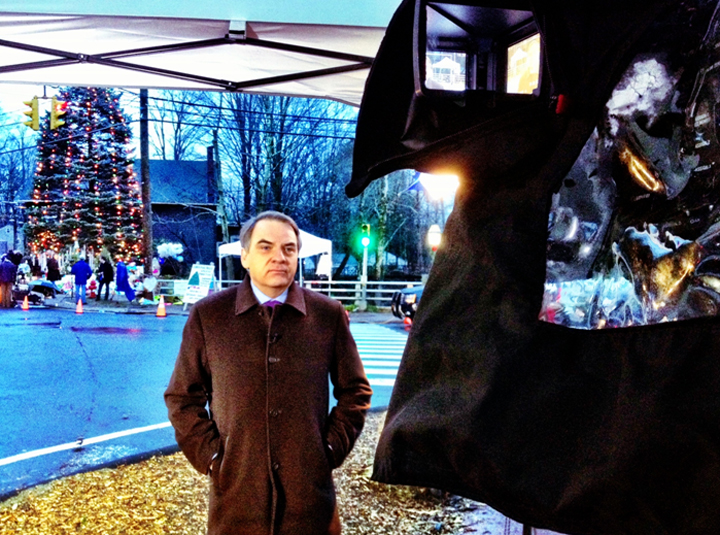When I was assigned to cover the school shooting story in Newtown last year, I hastily followed a routine I’ve deployed many times in more than 30 years as a reporter: I hustled home, packed a bag, got my travel documents in order and hurried to the airport to make a scheduled flight to Hartford. I was prepared for border control, the bumpy air ride and the long drive to the hotel — but I wasn’t prepared for the story that would unfold over the following days.

WATCH: (Dec. 14, 2013) It was one of the worst mass shootings in America, and highlighted the issue of gun control. Today, as the 26 victims of Sandy Hook were remembered, police are investigating another school shooting. Robin Stickley reports.
After sleeping at the hotel that night, my cameraman Adam and I made our way to the picturesque village of Sandy Hook, a cozy community within Newtown, where a killer had worked his evil at the well-respected elementary school. We would soon know his name: Adam Lanza. But to this day, we don’t know why he chose that school and decided to murder 20 children and six adults before turning the weapon on himself.
On the way to meet our Global colleagues, we stopped at a local gun shop. It should have been busy on a Saturday morning in December. But the hand-written sign on the door said otherwise: “Closed Today: Not Feeling Well” it read. Who was? For the next few weeks, there would be an intense scrutiny of America’s gun culture, gun laws and gun fascination.
We followed directions from resources producer Mark Blanchard, a wizard when it came to the logistics of news gathering, especially in a crisis. Within minutes of the shooting, Mark had called Sandy Hook, tracked down and rented empty retail space in the core of the village. For the next few days thanks to Mark’s arrangements, we worked from a spacious, bright location about 50 metres from the central intersection in this friendly community. Our space used to be a barber shop. Our team of a dozen had Wi-Fi, work tables, heat, and to the envy of the international media, our own washroom.
The Sandy Hook Deli was right across the street. Other reporters huddled here to write their stories (although many lived inside their cars without work space for a week). The little shop served great sandwiches; Mark had enlisted the owner to bring us coffee each day. On that first afternoon, the owner also brought over a fellow Canadian to our makeshift news bureau.
READ MORE: Bells toll in Newtown to mark year since shooting at Sandy Hook Elementary
Christine Crudo used to live in the Greater Toronto Area but moved to Sandy Hook with sons Nicolas and Luca and husband, Frank, who works in financial services at a large firm in New York. She told me the community was the perfect fit for the family. But 24 hours after the mass murder, you could tell Christine was taking this hard. “We knew the school psychologist who’s been killed, ” she told me outside the deli. Luca and Nicolas had both attended Sandy Hook Elementary. They told me how they couldn’t believe what happened. Fact is, everything had changed here in a matter of minutes thanks to one, tragic event.
WATCH: Sean O’Shea’s first report from the ground in Newtown, CT on December 15, 2012.
The small community would be overrun for days by national and international media, scrounging for snippets of facts and feelings. It’s our job. Although from personal experience, there is absolutely no joy on a day like this. We sought comment from anyone and everyone we could find: tearful visitors from New York; a passionate politician from the nearby village; a little girl and her mother who were in town from California. She was going to turn her experience into an essay for school.
As the cliche goes, in a small town everyone knows everyone. So, when the names of the children were released, it wasn’t difficult to find their families. We didn’t approach the families, but the U.S. media did. CNN enlisted its A-list anchors: Wolf Blitzer, Anderson Cooper and others to seek out interviews. And, as is more typical in the United States after a tragedy, many families actually agreed to share what they were going through.
Timeline: Deadly U.S. shootings since Newtown
Also typical after a tragedy is a desire to do something. I talked to J.R. Shine, a university student who rushed home to set up a table outside the deli and raise money for the families of victims. His bucket was filling up with $20 bills. Later, Tom Cavanagh from California would call another restaurant, offering to buy free coffee for the whole town. I’m not sure how many took advantage, but the makeshift sign on the restaurant door gave a lift.
I can still remember the smell of flowers left in memorials on the street up from our office. And hundreds–probably thousands of tiny teddy bears squeezed between candles and hand-written cards. (Someone even left a small group of bears beside our camera when we stepped inside to warm up.) Everywhere in this town — between reporters filing stories, police conducting investigations and locals trying to get ready for Christmas, there was a pervasive sense of sadness. Those poor kids, I thought. Those poor families. I can go home, but nothing will change what happened here.
A year ago, as the pictures of innocent young victims captured everyone’s hearts, it seemed certain the U.S. would make it harder to buy guns. President Barack Obama promised change when he visited the town during its time of grief. But it’s no more difficult for people to purchase firearms now than it was a year ago. The victims’ families fought for a change in the law, but there has been no change. They not only lost their loved ones, they’ve lost the hope that a similar tragedy won’t happen again.
On the final day there, I was struck by a local woman who caught my attention as I was about to do a live report. I half expected her to tell us to move on, leave the town alone to grieve. But I was wrong.
“Thanks for being here and telling the world about what happened,” she said with a smile. As terrible as the tragedy had been, she asked us not to forget what had happened or the people who died.
Sean O’Shea is a Global News reporter in Toronto. He covered the Newtown, CT school shootings.











Comments